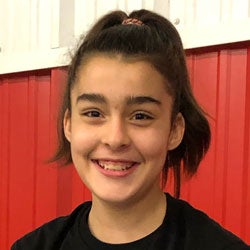AED Rescue
Twelve-year-old Skylar Wilson began her day on Oct. 15, 2018, just like any other, with her twin sister Sadie in keyboarding class at Muscle Shoals Middle School (MSMS). Things quickly took a turn when Skylar lost consciousness and went into cardiac arrest. At 8:10 a.m., Skylar’s heart stopped. “It is a day my family will truly never forget,” said Jessica Wilson, Skylar’s mother. “I never thought it would happen to my kid. She is so active and healthy, there were no warning signs for it. It just came as a shock.” Luckily, Sadie acted quickly. She caught Skylar before she hit her head and then immediately called for help. The teacher called for the school nurse, Kelley Word, who responded and took vital signs. Word and other staff members removed the classmates from the room and began CPR. After administering CPR, school staff used the school’s automated external defibrillator (AED) to monitor her heart and waited until first responders arrived and transported Skylar to Children’s of Alabama’s Emergency Department in Birmingham. The episode underscored the importance of having an AED available and the necessity for conducting AED emergency drills as part of the AED training. Drills and training conducted by the school played a vital role in the successful care Skylar received. Nationwide, thousands of school-age children die from sudden cardiac arrest each year and only 5 to 10 percent survive without immediate treatment. An AED can increase the survival rate to 50 percent. “Everyone involved knew what to do, and it just all lined up like clockwork,” Jessica Wilson said. MSMS trains for a situation like Skylar’s every year, but this was a rare occasion when they had to put that training to use. Skylar was admitted to the hospital that Monday, and tests were performed to monitor her heart rate and give Skylar and her family some answers. Skylar had no pre-existing heart condition and there was no foreseeable explanation as to why this happened, Jessica said. That Friday, Skylar underwent a procedure to have an automatic implantable cardioverter-defibrillator (AICD) placed in her chest. The AICD, or her “protector” as her family affectionately calls it, will monitor Skylar’s heart rate and will shock her heart if it detects a life-threatening change to her heart’s rhythm. Skylar’s mother said the biggest challenge they face now is slowing her daughter down. “She has such amazing strength and is such a fighter,” Jessica said. “She insisted on going back to school on Wednesday after being discharged on Saturday. The school has been amazing in accommodating her so that she would have a smooth transition back.” A 2007 survey conducted with the Alabama State Department of Education identified 71 public high schools and 107 public middle schools that did not have any AEDs on campus. Cris Brown, working with Dr. Yung Lau and Barbara Mostella of the University of Alabama at Birmingham (UAB), created Alabama LifeStart to address this need. A grant from Children's of Alabama funded the pilot program conducted in the Black Belt where there was a high concentration of schools lacking the devices. To date more than 300 schools have been provided with AEDs or AED trainer units from Alabama LifeStart. At least four students’ lives have been saved as a result of the quick response of school staff using those devices. Dr. Lau serves as Alabama LifeStart medical director and Brown has managed the project since its inception.







